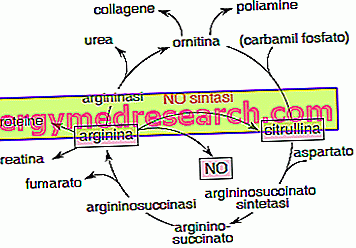Citrulline is a non-ordinary, non-essential alpha amino acid. While not directly participating in protein synthesis, citrulline performs important functions in the body as a key intermediate in the urea cycle, through which mammals eliminate superfluous amino groups.
Citrulline can be:
- taken through the diet: the watermelon is particularly rich, especially in the green outer shell; just from the watermelon, the citrulline was isolated and discovered in 1930
- synthesized from ornithine and carbamyl phosphate in one of the central reactions of the urea cycle
- Synthesized starting from arginine as a by-product of the reaction operated by enzymes, called NO synthase (NOS), which produce nitric oxide starting from arginine.
Recent scientific evidence suggests that the integration of L-Citrulline may be particularly useful for increasing levels of arginine in the blood, available for the synthesis of nitric oxide and for other amino acid functions.

Arginine is a semi-essential amino acid, which unlike ornithine is widely present in foods; only 5-15% of the circulating levels of arginine would derive from the synthesis from scratch in the body.
After oral intake, arginine is subject to extensive pre-systemic and systemic elimination, for example by intervention of intestinal bacteria and hepatic and intestinal arginases which convert it into ornithine and urea. These factors significantly reduce the amount of arginine available for the synthesis of nitric oxide and for the other functions for which it is responsible, limiting the effectiveness of a specific oral supplementation.
The citrulline amino acid is not subjected to the presystemic and first pass elimination just described, and can be converted first into argininosuccinate, then into arginine acting as a precursor of such amino acid.
- Citrulline administration significantly increases both plasma arginine and citrulline levels in a dose-dependent manner.
At the same dosage and route of administration (by mouth), citrulline would guarantee an increase in almost double arginine blood levels compared to the same dose of slow-dose arginine, and about 20% higher than those of the same dose of immediate release arginine [1].
For this reason, L-citrulline - generally salified with malic acid → citrulline malate - is often combined with various arginine salts to increase the ergogenic effect.
The vasodilation induced by nitric oxide could on the one hand be useful in the health field for the treatment of mild erectile dysfunction, and on the other to promote an improvement in sports performance due to the increased supply of blood, and therefore of oxygen and nutrients, to the tissues involved in the effort. Added to this are the classic ergogenic effects of arginine supplementation, including:
- Increased growth hormone release;
- Increased lean mass;
- Better sports performance;
- Increase in resistive capacity and maximum force.
- Increase of recovery speed
There are very few scientific studies on the ergogenic properties of citrulline in the literature. In a study [2] 17 pre-professional level cyclists were divided into two groups: one for placebo control and one second for supplementation with 6 grams of citrulline malate two hours before the exertion (a 137 km cycling stage) ). Through the analysis of blood samples taken at baseline, 15 minutes and three hours after the race, the researchers showed that the administration of citrulline can increase post-growth levels of growth hormone and enhance the use of amino acids, in particular those with branched chains during exercise; it would also contribute to increasing the production of arginine metabolites, such as creatinine, ornithine, urea and nitrite, a clear sign of an effective metabolic conversion into arginine.
BIBLIOGRAPHY
[1] Institute of Experimental and Clinical Pharmacology and Toxicology, University Medical Center Hamburg-Eppendorf, Germany.
Pharmacokinetic and pharmacodynamic properties of oral L-citrulline and L-arginine: impact on nitric oxide metabolism.
Schwedhelm E, Maas R, Freese R, Jung D, Lukacs Z, Jambrecina A, Spickler W, Schulze F, Böger RH.
[2] Departament de Biologia Fonamental i Ciències de la Salut, University of Balearic Islands, Palma de Mallorca, Illes Balears, Spain.
L-citrulline-malate influence over branched chain amino acid utilization during exercise.
Sureda A, Córdova A, Ferrer MD, Pérez G, Tur JA, Pons A.



